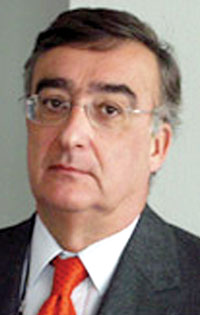 Nepali Times: How do you evaluate Nepal's People's Movement of April 2006?
Nepali Times: How do you evaluate Nepal's People's Movement of April 2006?
Herve Jouanjean: Very positively. The problem is that the degree of information available to the average citizen in Europe. From the media, the European public knows that the people were fed up with the royal regime, that the seven party alliance started a people's movement and that the king retreated under pressure. The public is much less aware of the intricacies within this general scenario, including the role of the Maoists in making the movement successful.
What are the challenges ahead?
All the energy has now to be put into the process of peace and reconciliation. The people of Nepal have said that they want a political resolution and everyone must support this 100 percent. The government is made up of some very astute politicians who have gone into this with their eyes wide open. They know the risks and have evaluated the challenge. They know how to play poker, understanding the strengths and weaknesses of the partners. This is a dangerous game but what else can you do when a force that has been underground for 10 years says that it is ready to talk?
Are you confident they can resolve their differences?
I look at the wisdom of the Nepali people, who have told their politicians to go ahead in the dialogue with the Maoist rebels knowing there is no military solution. At the same time, this wisdom will not be well served if the elections to be held in the future are not free and fair.
The European Union represents one of the finest examples of reconciliation and reconstruction of modern times. Despite so many deaths, the enemies of the Second World War learnt to courageously work together. We learnt to sit across the table and have dialogue, which led to reconciliation and reconstruction.
How do you propose to help Nepal now?
After the royal coup of 1 February 2005, we suspended all assistance except in the humanitarian arena, including assistance to UNHCR and the Office of the High Commissioner on Human Rights. We provide fully 80 percent of the assistance for the OHCHR. The Commission has now decided to resume all assistance so about 20 million euros halted in the pipeline will immediately begin to flow. And after 1 January 2007, you can expect a new phase of program assistance for Nepal. We will watch the peace and democracy restoration process closely to make sure there is no slippage. If everything goes well, then we will bring forth an extensive new package of EC assistance for Nepal, which will seek to target rural areas.
What if there is slippage?
If, for example, the Maoists do not cooperate on the path to peace and democracy, we will be forced to reconsider the support promised after January 2007. This will also be true of other donors, I believe.
What is your level of confidence in Nepal's future?
My answer is simple-let us do it, let us move ahead with the best of expectations. Among the politicians there is a roadmap and a political vision. However, we are not blind to the fact that there are so many complex details to be managed. This includes demobilisation, decommissioning of arms, rehabilitation of the violence-affected population and reconciliation. The rebel fighters will have to be rehabilitated as well, for they will not easily go back to the village. At the Commission, we have experience with this kind of situation in Latin America and in Aceh.


